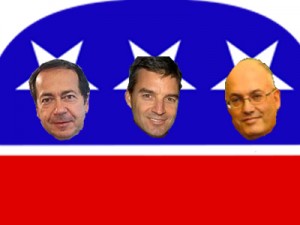Political contributions by corporations are often balanced with more or less equal amounts donated to competing parties. Corporations adopt this approach so as to project a neutral image towards the leading parties. But surprisingly hedge funds have been one-sided in recent years in their support to the political parties according to data published by the non-partisan, not for profit research group Center for Responsive Politics which tracks the flow of money in politics and its effect on elections and public policy. The data shows that hedge funds have flipped their loyalty towards Republicans in recent years, prompted by the party’s opposition to bills such as the Dodd Frank Act which attempts to limit the flexibility of hedge funds and forces funds to disclose previously unreported information.
Hedge Funds Switch Support
 According to the research firm Center for Responsive Politics, hedge funds gave 67 percent of donations to Democrats in 2008 but have since switched their loyalty to Republicans. In the 2010 mid-term election, Republicans received 53 percent of hedge fund donations and the trend continued in 2012 during the presidential election when Democrats received just 24 percent of hedge fund donations. So far this year with a mid-term election round the corner, hedge funds have continued to favor the Republican Party with 67 percent of the industry’s contribution going to the Republicans.
According to the research firm Center for Responsive Politics, hedge funds gave 67 percent of donations to Democrats in 2008 but have since switched their loyalty to Republicans. In the 2010 mid-term election, Republicans received 53 percent of hedge fund donations and the trend continued in 2012 during the presidential election when Democrats received just 24 percent of hedge fund donations. So far this year with a mid-term election round the corner, hedge funds have continued to favor the Republican Party with 67 percent of the industry’s contribution going to the Republicans.
Among the hedge fund managers switching loyalty are Dan Loeb of Third Point Capital and Steve Cohen of the now defunct SAC Capital. Both were once strong supporters of the Democratic Party but have completely shifted their allegiance. Other well known managers who have jumped ship include John Paulson of Paulson & Co and Ken Griffin of Citadel. Both of them gave equally to the two leading parties in 2008 but have since become big donors to the GOP.
Dodd Frank Act Biggest Concern
The shift in loyalty is almost entirely attributed to the hedge fund industry’s concern over the Dodd-Frank Wall Street Reform and Consumer Protection Act, especially the regulation of over-the-counter (OTC) derivatives. The law supported by Democrats brings a measure of government oversight to derivative trades. Republicans have vowed to repeal or blunt the law.
The industry’s resentment toward Democrats is also a result of President Obama’s populist attacks on Wall Street, including singling out hedge funds for their role in the 2008 financial crisis. The hedge fund managers are concerned that such populist rhetorical salvos unfairly subjected them to ridicule for financial success.
Relevance to Job Market
The noticeable shift in the loyalty shows the industry’s concern on government actions that restrain the risk-taking ability of hedge funds as well as curtail a fund’s flexibility. Hedge funds are known for taking an unconventional approach to identifying investment opportunities. Government intervention in the form of oversight will hinder a fund’s ability to execute certain strategies that may be viewed as too risky. Restraining a fund from freely executing certain trading strategies will likely be a dampener to its hiring plans. As a result, strengthening or introduction of laws which impose new reporting requirements on hedge funds will likely have long term negative implications for the industry’s job market.
{ Comments on this entry are closed }





